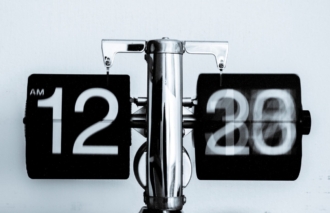One of Mahatma Gandhi’s most treasured possessions was an Ingersoll pocket watch that cost about a dollar. Adamant about punctuality, the world-renowned pacifist was never without it.
Gandhi lived his life according to a strict timetable.
In his words:
You may not waste a grain of rice or a scrap of paper, and similarly a minute of your time.
Today, most of us have our own timetables, with calendar alerts for meetings, appointments, fitness classes, and more.
We constantly look at the time, especially on our smartphones (which we check an average of 47 times per day). And yet, we all know someone who’s chronically tardy. Maybe we are that person.
Why are so many of us still late? And how did Gandhi, with a single pocket watch, manage to be consistently punctual?
Gandhi excelled at something that many of us struggle with: focusing on one thing at a time. In our productivity-obsessed world, tardiness is often a result of trying to do too many things at once.
When we understand why we’re always late, we can improve our own punctuality. And because tardiness doesn’t necessarily signal a lack of respect, we can find ways to support our less-punctual friends and colleagues.
Why are some people always late
1. It’s a personality trait
For many people, chronic tardiness stems from trying to do it all, all the time.

Opening up about her perpetual lateness, New York Times bestselling editor Georgia Francis King writes:
Because I’m always trying to use every single minute of my day productively, I wind up being late for much more important things.
It’s no secret: we’re addicted to busyness. We feel guilty if we’re not doing something. By getting comfortable doing nothing at all, we can free our minds up to focus on higher priorities — and increase our likelihood of arriving on time.
Experts have also found that certain people tend to move through the day in a more intuitive way, rather than feeling controlled by the clock. Robert Levine, a professor of social psychology at California State University, calls this “event time.”
According to Levine, those who live by event time allow events to dictate the rhythm of their days. Projects are finished when they feel done; meetings are over when the discussion has run its course.
And though people can function in both modes, most of us have a default — which is likely an inborn trait.
At Jotform, I’ve found that many employees work best when they’re free to function in an intuitive mode, or on event time. They’re more productive when they can get into deep flow, and they’re not racing against the clock.
2. But sometimes, it’s a cultural difference
While serving as liaison to a former governor in Iraq, Sandi Austin quickly realized a stark cultural difference.
“After planning numerous events and spending many hours waiting and waiting at the gate, I finally realized that time, schedules, and punctuality have no leash on Iraqi culture,” she explained in a story for the New York Times.
People there are not apologetic when they arrive late because time is not as important to them. The fact that they show up at all and God allowed them to travel safely is all that matters.
Though she initially struggled to acclimate, Austin learned to not take offense at her Iraqi counterparts’ tardiness. She even began to appreciate their tendency to focus less on time and more on living in the moment.
Different cultures have unique approaches to scheduling. In some countries, people don’t sweat the time and showing up late is no big deal.
For example, in Mexico, it’s acceptable to arrive up to half an hour late. Nigerians allow each other an hour window from the agreed upon time. And in Morocco, you can be an entire day late without causing offense.
On the other side of the spectrum are nations like Germany, Japan, South Korea, and my home country, Turkey. In these countries, you’re expected to call if you’re running behind, and failing to do so is considered rude.
It’s important to keep these differences in mind when working with foreign colleagues or companies. I’m lucky that Jotform has offices in two countries with similar attitudes toward timeliness (the United States and Turkey), so interoffice video conferences generally start on the dot.
But that’s not always the case, and being aware of these differences can help us to avoid misunderstandings.
3. Generational differences affect timeliness, too
Age differences can also contribute to varying perspectives on scheduling. Sometimes, when I chat with older colleagues, they’re shocked to hear that some of our younger employees arrive to the office at 10 am or later — and I’m fine with it.
As I’ve learned in the last 13 years, it’s not because our millennial employees are working less, or because they don’t care. It’s because they’re often answering emails from home at 8 in the morning; or because they’re at the office during their peak hours — late at night.

Younger generations value flexibility at work. A recent FlexJobs survey asked 3,000 millennials to choose the most important factors when evaluating a job prospect. Among the top five factors were work-life balance (84 percent), work flexibility (82 percent), and work schedule (65 percent).
Millennials want jobs that offer flexibility, even if that means taking a pay cut.
For many of them, flexibility means they don’t have to follow an arbitrary 9-to-5 schedule, and can work based on when, where, and how they’re most productive: whether that means working late nights or from a coffee shop.
With that in mind, it’s important for managers to accommodate different scheduling approaches, while offering support to the chronically tardy among us.
How to remedy, not resent, tardiness
Assuming you’re not dealing with someone who enjoys making others wait — Diana DeLonzor, author of “Never Be Late Again,” refers to this type of tardy person as the “Rebel” — here are some tips for remedying chronic lateness. Or, if you’re the colleague who’s always running behind, hopefully they can improve your own punctuality.
The first step is to identify the cause of the tardiness. Maybe you, like Georgia Francis King, are a multitasker who is always overbooked.
Jeff Conte, an associate psychology professor at San Diego State University, found that multitaskers tend to perceive time more slowly. These people are often so engrossed in what they’re doing that they frequently lose track of time.
DeLonzor identifies other categories of late-goers, including: the “Evader,” who struggles to leave an existing task until it’s perfect; the “Indulger,” who lacks self-control; and the “Deadliner,” who likes the thrill of a last-minute rush.
Whatever the root cause may be, even something as benign as enjoying a deadline-driven adrenaline rush, it’s not working out — and you’re wasting other people’s valuable time. The only solution is to correct the relevant behavior.

So, if you lack the discipline to be punctual, set a calendar alert (or three) the moment an appointment is scheduled. If you’re a chronic multitasker, get in the habit of leaving open time windows between tasks, and use them to sit with your thoughts.
At the same time, I think it’s important to embrace each person’s innate scheduling style so they can do their best work.
That’s why at Jotform, most of us maintain a “hybrid” calendar, which accommodates both the inevitable clock-time meetings, as well as large swaths of time for uninterrupted, clock-free creative work.
And I encourage our employees to automate as much as possible — weekly emails, meeting alerts, reports — to minimize the possibility of missing a deadline.
If one of your colleagues continues to show up late, try explaining the consequences, not in terms of minutes or hours, but rather, in terms of the impact on others.
For example:
You were late, and as a result, Andy had to take the lead in our client meeting and struggled to explain our proposal to them.
Once you diagnose the problem, you can create an action plan that matches the root issue.
The benefits of supporting lateness
I think we can all agree that it’s frustrating when someone makes us wait. But before we jump to conclusions about our friend or colleague’s lack of respect, it’s important to recognize that there are various reasons for tardiness. Often, it comes down to personality traits, cultural norms, or generational differences.
For younger generations, workplace flexibility is increasingly important. That’s why companies are better off when managers and employees try to support, rather than feel insulted by, colleagues who don’t function on clock-time.
Plus, you’ll likely feel better when you give your late friend the benefit of the doubt.









































































Send Comment: